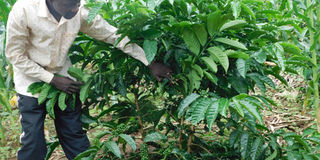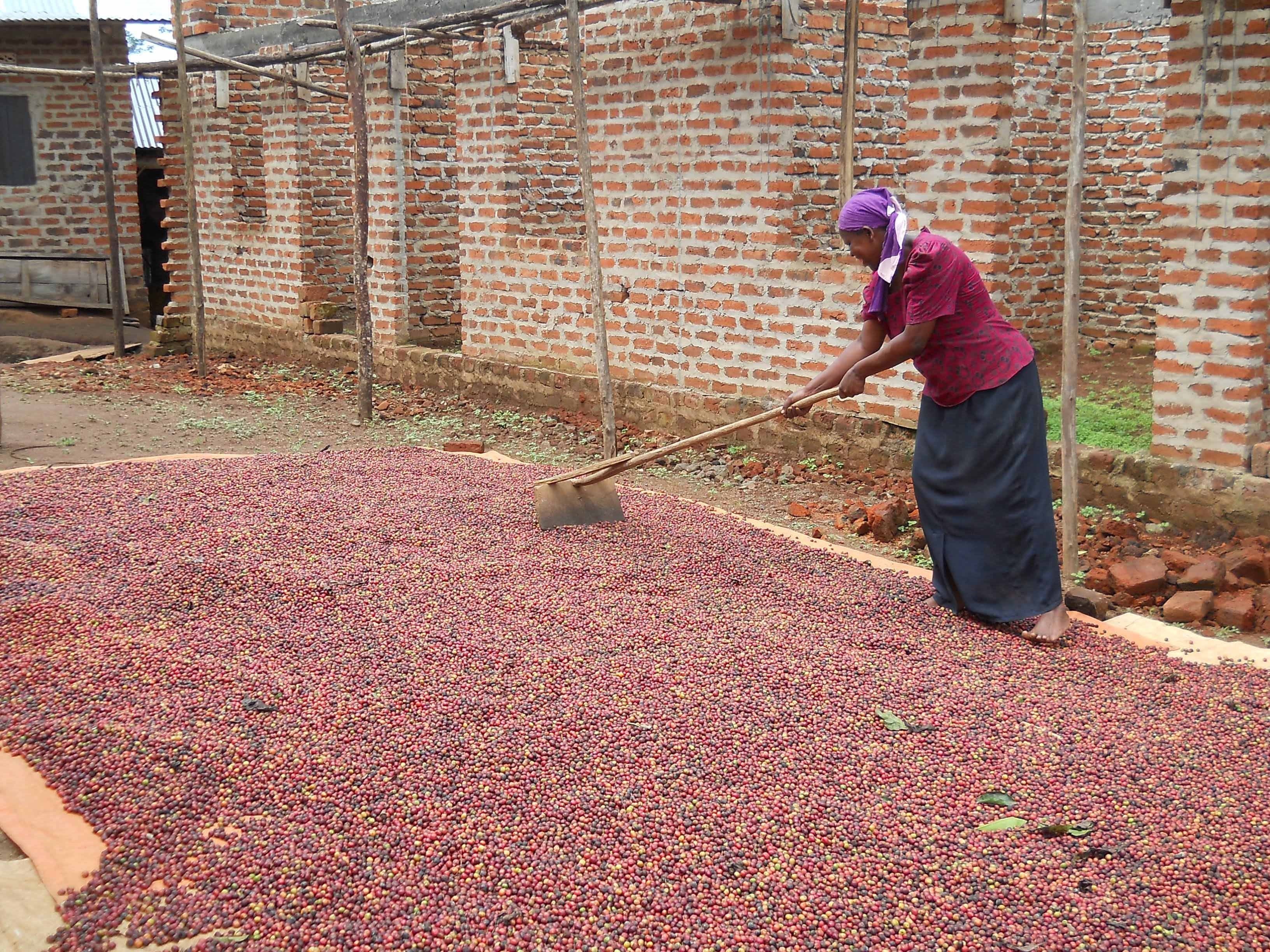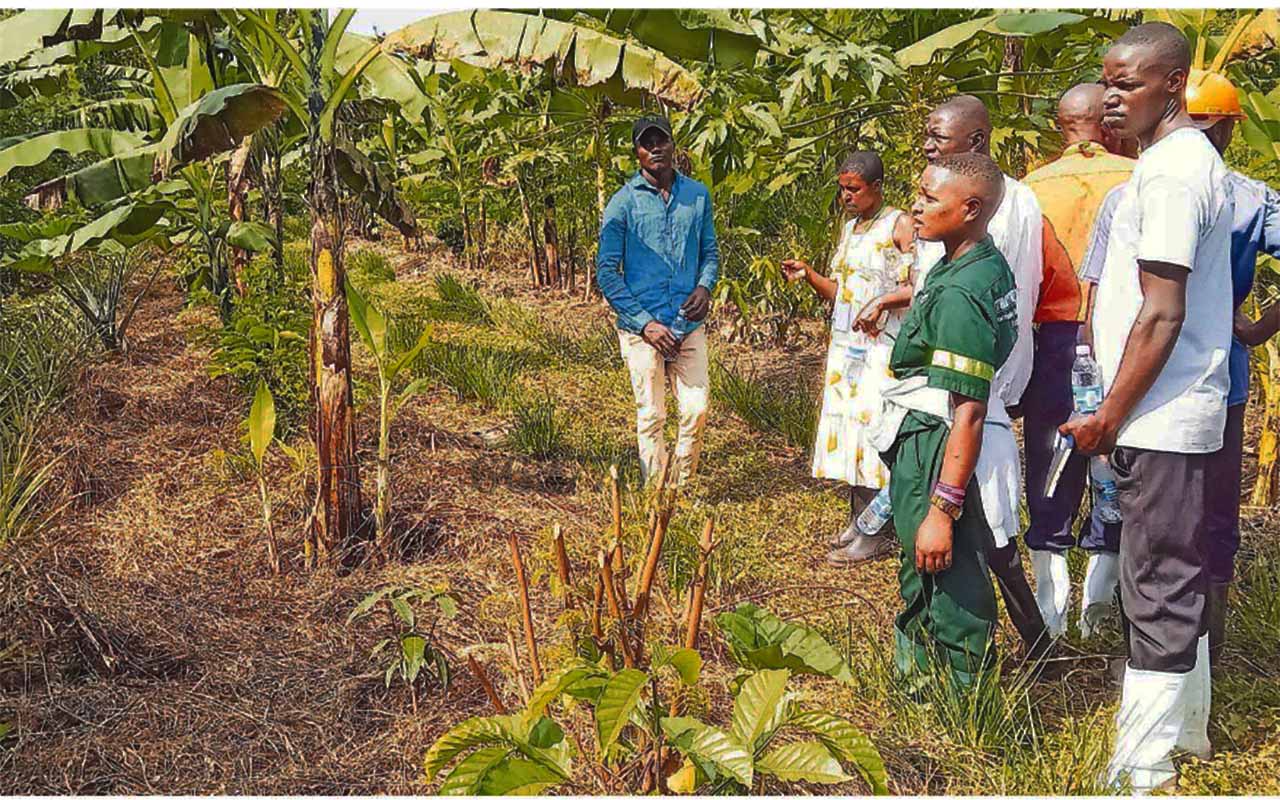
A farmer takes a look at one of the young coffee trees. PHOTO/Michael J Ssali
As the peak coffee harvesting season comes to an end in most parts of Uganda, there is a marked sign of satisfaction among the majority of farmers that coffee growing is a worthwhile occupation.
For those who live in the coffee growing rural areas the most common news is about people buying new cars, new motorcycles and new bicycles.
Many others are putting up brick houses and roofing them with tiles or iron sheets. Yet others are putting new coats of paint on their buildings to give them a facelift.
High prices
They were all unbelievably surprised by the sudden high rise of the coffee prices following a longer than usual heavy rain season which had resulted in good coffee yields for nearly all farmers. They have had the crop in plenty when the prices are so good, at about Shs13,000 per kilogramme. Some people in Buganda region attribute the big economic gain to the Mwanyi Terimba campaign initiated some years ago by the Buganda Kingdom, but many others who include Gerald Ssendaula, former minister of Finance, think that the coffee farmers owe their present joy to the NRM government which began much earlier to encourage them to grow the crop and even went as a far as supplying free coffee seedlings to the intending farmers.
Whatever the case, there is increased interest nearly everywhere in growing the crop and it is expected that before long Uganda will hit the desired coffee production target of 20 million 60-kilogramme-bags per year.
Economic importance
Sowedi Sserwadda, chairman, Kibinge Coffee Farmers Cooperative Society, told Seeds of Gold, “People have suddenly realised the economic importance of coffee, after seeing their colleagues who planted the crop buying new vehicles and building better houses. They are now cutting down eucalyptus forests and clearing bushes to create space for coffee growing. This situation has led to high prices for land. Nowadays land is valued according to the amount of coffee that can be grown on it. Even people who had purchased small pieces of land for house construction before have now chosen to plant coffee on the land, because they know that they can at least earn as much as six or Shs6m every year from an acre of land.”
Factors
Asked what could have led to the sudden high rise in the coffee prices, Sserwadda said, “The farmers have been more careful with handling the crop this time. They have been drying the coffee on tarpaulin or cemented floors and no longer on the bare ground. They have been picking red ripe cherries. And mostly, these days, people are growing improved varieties which have led to better yields that are required on the international market. We are fortunate to be the producers of coffee with a unique taste which is much sought after by the consumers worldwide.”
Gerald Ssendaula, who is not only a commercial coffee farmer but also the chairman of National Union of Coffee Agri-businesses and Farm Enterprises (NUCAFE), said the sudden sharp rise in the coffee prices could be attributed to the increased demand for the coffee beverage across the world.
“China is now a big consumer of coffee,” he told Seeds of Gold. “There is a province in China where some coffee is grown but it does not produce enough because the population is quite big. More and more countries across the world are taking to coffee drinking without producing the crop themselves. This has led to a bigger demand for coffee and the higher prices that are being paid for the crop right now. We have to realise too that coffee is no longer just a beverage to drink but also a raw material for a number of other products such as “Coffee Turmeric Body Cream” prepared by Naro and is said to give a bright, radiant skin to the users.”
Dangers
He is concerned about the looming decision by the government to put Uganda Coffee Development Authority (UCDA) under the Ministry of Agriculture, Animal Industry and Fisheries. He believes that coffee is such an important crop to the country’s economy that it ought to be handled separately and very carefully under a special team of experts such as UCDA. “If it is put under the ministry farmers are likely to face long delays to take and implement decisions due to too much bureaucracy,” he said. He also wants more sensitisation of farmers about coffee handling.
Shaffic Ssenyimba, coffee technical officer working with UCDA in the Greater Masaka sub-region, said, “The main coffee season in Greater Masaka this year has been notable for several key developments that have impacted the local coffee industry. One of the most remarkable observations has been the surge in coffee prices, with Fair Average Quality (FAQ) coffee commonly known as Kase reaching an impressive Shs14,500 per kilogramme. This price hike however has been accompanied by an increase in coffee theft incidents across the region. Despite this challenge the volume of coffee harvested this season has reached a high record compared to previous years.”
Ssenyimba attributes the significant increase in yield to several factors including the expansion of coffee cultivation across greater Masaka and the implementation of improved farm management practices. He said UCDA has played a crucial role in this success by providing valuable support and guidance to local farmers.
“Another positive development has been the marked improvement in the quality of the coffee harvested this season. Over 90 percent of the farmers have been observed harvesting red cherries and properly drying their coffee on tarpaulins. This improvement in quality is largely due to the massive sensitisation efforts and the enforcement of the National Coffee Act by the UCDA which has emphasised the importance of harvesting and processing practices that ensure high quality coffee.”
He said that in order to address the rise in coffee theft, many farmers, particularly those in cooperatives, have set up monitoring groups equipped with whistles and mobile phones to report suspects to the police.








